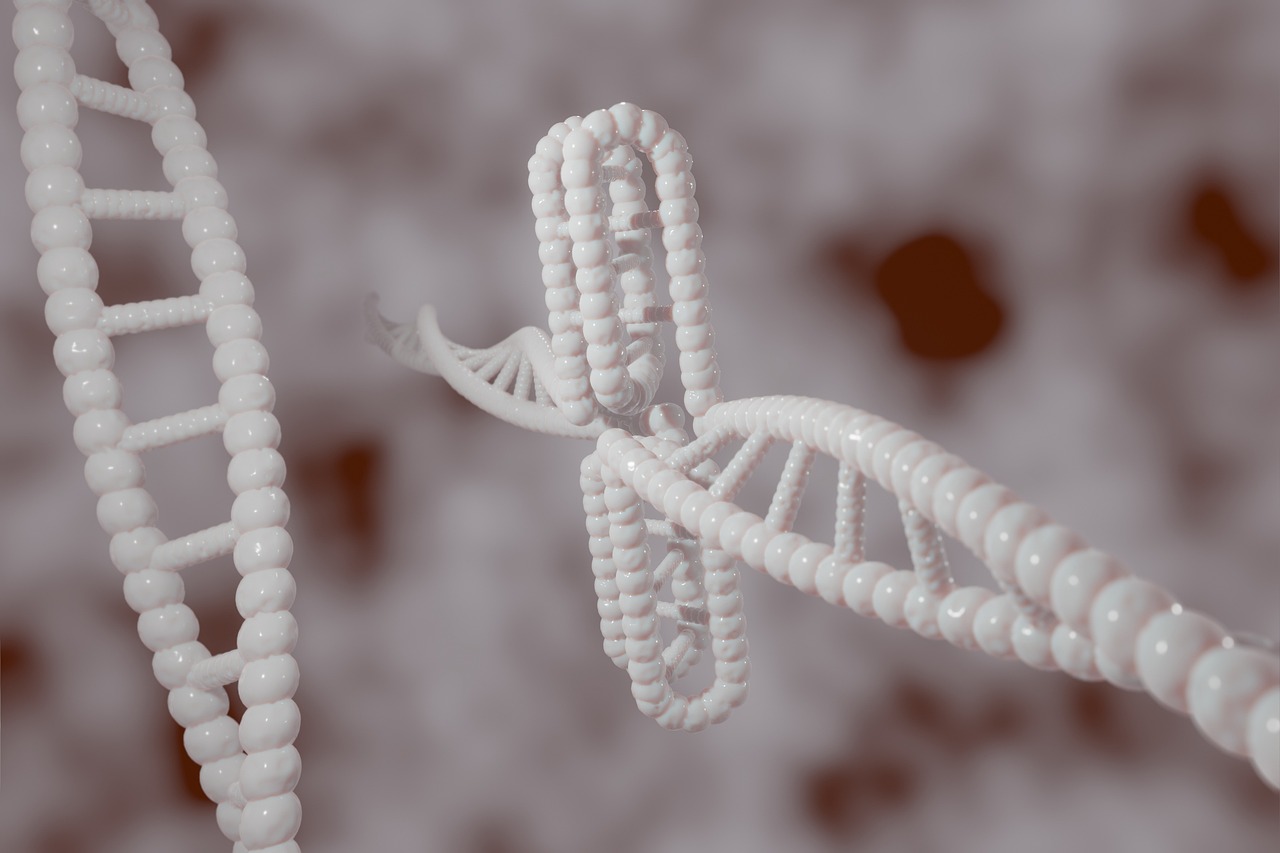Understanding the Role of Genetics in Behavioral Traits
Have you ever wondered why you might share certain quirks or traits with your family? The answer often lies in our genetic makeup. Genetics plays a pivotal role in shaping not just our physical characteristics but also our behavioral traits. This article delves into the fascinating interplay between heredity and environment, shedding light on how our genes influence who we are and how we behave.
At the core of this discussion is the understanding that our behaviors are not solely a product of our environment; they are also deeply rooted in our DNA. DNA, the blueprint of life, is composed of genes that dictate various aspects of our biology, including our predispositions to certain behaviors. The complexity of these interactions makes the study of behavioral genetics a captivating field, revealing insights that can change our understanding of psychology and sociology.
As we explore the genetic influences on behavior, we will also touch on the nature vs. nurture debate, a long-standing discussion that questions the extent to which our genes or our environment shape our personalities and actions. Are we merely products of our genetic inheritance, or do our experiences and surroundings play a more significant role? This question has intrigued scientists, psychologists, and philosophers alike, leading to numerous studies that seek to unravel the intricate connections between our genes and our behaviors.
Throughout this article, we will examine key concepts in genetics, explore historical perspectives on the nature vs. nurture debate, and highlight influential studies that have shaped our understanding of behavioral traits. We will also look at modern approaches in research, such as twin studies and genome-wide association studies (GWAS), which continue to provide valuable insights into the genetic underpinnings of behavior.
Moreover, we will investigate how gene-environment interactions contribute to the complexity of behavioral traits. This exploration will reveal that while genetics provides a foundation, the environment can significantly modify how these traits manifest in real-life scenarios. For instance, a person may carry genes associated with aggression, but whether they exhibit aggressive behavior can depend heavily on their upbringing and social environment.
In addition to discussing the scientific aspects, we will also consider the implications of understanding the genetic basis of behavior. This includes the ethical dilemmas that arise from behavioral genetics research, such as issues of privacy and the potential for discrimination based on genetic predispositions. As we advance our knowledge in this field, it is crucial to navigate these challenges thoughtfully.
By the end of this article, we hope to provide a comprehensive overview of how genetics influences behavioral traits, equipping you with a deeper understanding of yourself and those around you. So, buckle up as we embark on this enlightening journey through the world of genetics and behavior!
- What is behavioral genetics? Behavioral genetics is a field of study that examines the role of genetic and environmental influences on behavior.
- How do genes influence behavior? Genes can predispose individuals to certain behaviors, but environmental factors also play a crucial role in shaping how these behaviors are expressed.
- What is the nature vs. nurture debate? This debate centers on whether genetics (nature) or environmental factors (nurture) have a more significant impact on human behavior and personality.
- Are behaviors solely determined by genetics? No, while genetics can influence behavior, environmental factors, experiences, and personal choices also significantly contribute to how we act.
- What are some ethical concerns in behavioral genetics? Ethical concerns include privacy issues, potential discrimination based on genetic predispositions, and the risk of genetic determinism.

The Basics of Genetics
Genetics is a fascinating field that serves as the cornerstone of our understanding of biological inheritance. At its core, genetics deals with how traits and characteristics are passed down from one generation to the next through DNA. This molecule is like the instruction manual for building and maintaining an organism. To fully grasp the role genetics plays in behavior, it's essential to familiarize ourselves with some fundamental concepts.
At the heart of genetics are genes, which are segments of DNA that encode instructions for producing proteins. These proteins are crucial for various bodily functions and significantly influence our physical traits, such as eye color and height, as well as behavioral tendencies. Genes are organized into structures called chromosomes, which humans typically have 23 pairs of. One set comes from each parent, contributing to the unique genetic makeup of an individual.
To visualize how genes work, think of them as recipes in a cookbook. Each recipe (gene) provides specific instructions for creating a dish (protein). Just as a chef can modify a recipe to create a new dish, genetic variations can lead to different traits. This is where the concept of alleles comes into play. Alleles are different versions of a gene; for example, a gene that determines flower color might have a red allele and a white allele. The combination of alleles inherited from our parents helps shape our unique characteristics.
Moreover, genetics is not just a simple one-way street. The interaction between genes and the environment is complex and dynamic. For instance, a person might inherit a genetic predisposition for a certain behavior, but whether that behavior manifests can depend significantly on environmental influences. This interplay is crucial in understanding behavioral traits.
To summarize, the basics of genetics encompass the following key components:
- DNA: The molecule that carries genetic information.
- Genes: Segments of DNA that code for proteins and influence traits.
- Chromosomes: Structures that organize genes within cells.
- Alleles: Different versions of a gene that contribute to variations in traits.
Understanding these components sets the stage for delving deeper into how genetics influences our behavior. As we explore the nature versus nurture debate, it becomes clear that genetics is just one piece of a much larger puzzle. The intricate dance between our genetic makeup and our environment shapes who we are in profound ways.

The Nature vs. Nurture Debate
The nature vs. nurture debate has been a hot topic in psychology and sociology for decades. It's like a never-ending tug-of-war between two powerful forces: our genetic makeup and our environment. On one side, we have nature, which represents the biological factors that contribute to who we are. This includes our DNA, genes, and chromosomes. On the other side, nurture encompasses the experiences, upbringing, and environment that shape our behavior and personality. So, which one is it? Are we more influenced by our genes, or is it the world around us that molds us into the individuals we become?
To understand this debate, we need to dive into the intricacies of both sides. For instance, geneticists argue that certain traits, such as intelligence and aggression, have strong hereditary components. They point to studies involving twins and families, which suggest that genetics can play a significant role in determining these traits. In fact, some researchers have identified specific genes that correlate with aggressive behavior, making a compelling case for the nature side of the argument.
Conversely, proponents of the nurture perspective emphasize the importance of environmental influences. They argue that experiences, culture, and education can drastically shape behavior and personality. For example, a nurturing environment can foster resilience and emotional intelligence, while a harsh upbringing might lead to behavioral issues. This side of the debate highlights that even if we have a genetic predisposition towards certain traits, the environment can either amplify or mitigate these tendencies.
Historically, this debate has seen its fair share of twists and turns. In the early 20th century, the prevailing thought leaned heavily towards nature, with eugenics movements gaining traction. However, as the field of psychology evolved, researchers began to recognize the significant impact of nurturing factors. Today, most scientists agree that it’s not an either-or scenario; instead, it’s the interplay between nature and nurture that ultimately shapes our behavior.
To illustrate this complex relationship, consider the following table that summarizes key points in the nature vs. nurture debate:
| Factor | Nature (Genetics) | Nurture (Environment) |
|---|---|---|
| Definition | Biological inheritance and genetic predispositions | Life experiences and social influences |
| Key Influences | DNA, genes, and chromosomes | Family, culture, education, and social interactions |
| Examples of Traits | Intelligence, aggression, personality traits | Resilience, emotional intelligence, social skills |
| Research Methods | Twin studies, family studies, genetic mapping | Case studies, observational studies, surveys |
In conclusion, the nature vs. nurture debate is not just a philosophical discussion; it has real-world implications for how we understand human behavior. By acknowledging the roles of both genetics and environment, we can better appreciate the complexities of human development. This understanding can lead to more effective approaches in education, mental health treatment, and even criminal justice. After all, if we can identify the factors that contribute to certain behaviors, we can work towards solutions that address the root causes rather than merely treating the symptoms.
- What is the nature vs. nurture debate? It is a discussion regarding the relative contributions of genetic inheritance (nature) and environmental factors (nurture) to human development and behavior.
- Can behavior be solely attributed to genetics? No, behavior is influenced by both genetic and environmental factors, and their interaction is complex.
- Are there any traits that are purely environmental? Many traits, such as language and social skills, are heavily influenced by the environment, though genetics can still play a role.
Historical Perspectives
The nature vs. nurture debate has a rich history that stretches back centuries, capturing the imagination of philosophers, scientists, and the general public alike. It raises profound questions about what shapes us as individuals: our genetic makeup or the environments we inhabit. This discourse has evolved significantly over time, influenced by pivotal studies and groundbreaking theories that have laid the groundwork for modern behavioral genetics.
In the early 20th century, the concept of heredity gained traction with the work of Gregor Mendel, who is often referred to as the father of genetics. His experiments with pea plants revealed how traits are inherited, establishing a foundation for understanding genetic principles. However, it wasn't until the mid-20th century that the focus shifted towards human behavior. The discovery of the double helix structure of DNA by James Watson and Francis Crick in 1953 opened new avenues of exploration into how genetics could influence not only physical traits but also behavioral ones.
As the 20th century progressed, researchers began to conduct twin studies, which provided compelling evidence for the genetic basis of various behaviors. These studies compared identical twins, who share nearly 100% of their genes, with fraternal twins, who share about 50%. The findings consistently showed that identical twins exhibited more similarities in traits such as intelligence, aggression, and even personality, suggesting a significant genetic component. For instance, a landmark study by Bouchard et al. in the 1990s demonstrated that about 70% of the variance in IQ could be attributed to genetic factors.
Additionally, the field of psychology saw influential figures like Sigmund Freud and behaviorists such as B.F. Skinner, who emphasized the role of the environment in shaping behavior. Freud’s psychoanalytic theory focused on unconscious processes and early life experiences, while Skinner's operant conditioning highlighted how behavior is learned through reinforcement and punishment. These contrasting views laid the groundwork for the ongoing debate about the relative contributions of nature and nurture.
To further complicate the discussion, the late 20th century introduced the concept of gene-environment interactions, suggesting that it is not merely a matter of genetics or environment, but rather how these two forces interact. For example, a person may inherit a genetic predisposition for anxiety, but whether this trait manifests depends significantly on their environmental experiences, such as parenting styles or traumatic events. This understanding has led to a more nuanced perspective, recognizing that both genetics and environment play crucial roles in shaping behavior.
As we moved into the 21st century, advancements in technology allowed researchers to delve deeper into the genetic basis of behavior. Genome-wide association studies (GWAS) have emerged, enabling scientists to identify specific genetic variants associated with various behavioral traits. These modern approaches have provided unprecedented insights, but they also raise new questions about the implications of such knowledge.
In summary, the historical perspectives on the nature vs. nurture debate illustrate a complex interplay between genetics and environment. As research continues to evolve, it becomes increasingly clear that understanding behavioral traits requires an appreciation of both hereditary factors and the contextual influences that shape our lives. The journey through this fascinating field is ongoing, and it promises to reveal even more about what makes us who we are.
- What is the nature vs. nurture debate? The nature vs. nurture debate discusses the relative contributions of genetics (nature) and environmental factors (nurture) in shaping human behavior and personality.
- How do twin studies contribute to our understanding of genetics? Twin studies compare identical and fraternal twins to assess the influence of genetics on various traits, providing insights into the heritability of behaviors.
- What role do gene-environment interactions play? Gene-environment interactions highlight how genetic predispositions can be influenced by environmental factors, emphasizing the complexity of behavioral traits.
Influential Studies
When we dive into the world of behavioral genetics, we quickly realize that certain studies have profoundly shaped our understanding of how genetics influences behavior. One of the most pivotal studies in this arena is the Minnesota Twin Study, which began in the late 1970s. This groundbreaking research examined identical twins raised apart, providing a unique opportunity to differentiate between the effects of genetics and environment. The findings revealed that many behavioral traits, such as intelligence and personality, had significant heritable components. Isn't it fascinating to think that two individuals, separated at birth, could still share remarkable similarities in their behavior?
Another influential study that deserves mention is the work done by Robert Plomin and his colleagues, who have extensively researched the heritability of cognitive abilities. Their meta-analyses indicate that genetics can account for about 50% of the variance in intelligence among individuals. This insight has sparked further discussions about how we can nurture intelligence in educational settings, emphasizing the importance of both genetic predispositions and environmental factors.
Additionally, the research conducted by Caspi et al. (2003) on the interplay between genes and environmental stressors has opened new avenues of understanding. Their study identified a specific gene, the 5-HTTLPR, linked to the serotonin transporter, which appears to moderate the effects of stressful life events on depression. This work illustrates that while genetic predispositions can increase vulnerability to mental health disorders, environmental factors play a crucial role in determining whether these traits manifest.
To summarize, these influential studies underscore the complexity of behavioral genetics and the intricate dance between our genes and our environments. As we continue to explore this fascinating field, it becomes increasingly clear that understanding the genetic basis of behavior is not just about identifying specific genes, but also about appreciating the rich tapestry of interactions that shape who we are.
Modern Approaches
In the ever-evolving field of behavioral genetics, modern approaches have revolutionized our understanding of how genetics and environment intertwine to shape behavior. Researchers are now employing cutting-edge methodologies that dig deeper than ever before into the genetic underpinnings of behavioral traits. One of the most significant advancements is the use of twin studies, which compare the similarities and differences between identical and fraternal twins. This approach helps to disentangle the influence of genetics from that of the environment. By analyzing twins raised together versus those raised apart, scientists can gain insights into the heritability of specific traits.
Another groundbreaking method is the Genome-Wide Association Studies (GWAS), which analyzes genetic variations across large populations to identify links between specific genes and behavioral traits. This approach has become increasingly popular due to its ability to handle vast amounts of genetic data, making it easier to pinpoint genetic markers associated with various behaviors. For example, GWAS has been instrumental in uncovering genetic links to complex traits such as intelligence and mental health disorders.
Additionally, the integration of advanced technologies like CRISPR gene editing is paving the way for experimental studies that can manipulate specific genes to observe changes in behavior. This method offers a fascinating glimpse into causation rather than mere correlation, allowing scientists to establish more definitive links between genetics and behavior.
To illustrate the impact of these modern approaches, consider the following table showcasing some key studies and their findings:
| Study | Methodology | Key Findings |
|---|---|---|
| Twin Studies | Comparative analysis of identical vs. fraternal twins | High heritability for traits like aggression and intelligence |
| Genome-Wide Association Studies (GWAS) | Analysis of genetic variants in large populations | Identified specific genes linked to schizophrenia and ADHD |
| CRISPR Gene Editing | Manipulation of genes in model organisms | Demonstrated causal relationships between genes and behaviors |
These modern methodologies not only enhance our understanding of the genetic basis of behavior but also emphasize the complexity of gene-environment interactions. As researchers continue to explore these relationships, they uncover the nuanced ways in which our genetic makeup and life experiences converge to shape who we are. The implications of this research are profound, influencing everything from psychological treatment approaches to educational strategies tailored to individual genetic predispositions.
As we stand on the brink of new discoveries in behavioral genetics, it’s essential to remain aware of the ethical considerations that accompany such powerful knowledge. The potential for misuse or misunderstanding of genetic information underscores the need for responsible research practices and informed public discourse.
- What are twin studies, and why are they important? Twin studies are research methods that compare identical and fraternal twins to understand the influence of genetics versus environment on behavior. They are crucial for estimating the heritability of traits.
- What is GWAS? Genome-Wide Association Studies (GWAS) analyze genetic variations across large populations to identify links between specific genes and behavioral traits, providing insights into the genetic basis of complex behaviors.
- How does CRISPR technology relate to behavioral genetics? CRISPR technology allows scientists to edit genes in model organisms, enabling them to study the causal relationships between specific genes and behaviors, thus deepening our understanding of genetics in behavior.
Gene-Environment Interactions
When we think about behavior, it’s easy to get caught up in the idea of genetics versus environment, but the truth is that they are not mutually exclusive. Instead, they are intertwined in a complex dance that shapes who we are. Imagine a beautiful tapestry where each thread represents a different influence—some threads are vibrant and bold (like genetic predispositions), while others are softer and more subtle (like environmental factors). Together, they create a unique pattern that reflects our individual behaviors and traits.
Gene-environment interactions refer to the ways in which our genetic makeup can influence how we respond to environmental stimuli, and vice versa. This means that the same genetic predisposition can lead to different outcomes depending on the environment in which a person is raised. For example, consider two individuals with a genetic predisposition for anxiety. If one grows up in a supportive, nurturing environment, they may develop coping strategies that help them manage their anxiety effectively. In contrast, another individual with the same genetic predisposition, but raised in a stressful or hostile environment, may struggle significantly more.
Research in this area has revealed fascinating insights. For instance, studies have shown that certain genes associated with aggression can manifest differently based on environmental factors such as childhood experiences or social interactions. A child with a genetic predisposition toward aggression may develop more violent tendencies if they are exposed to violence in their home or community. However, if they are raised in a peaceful, loving environment, those genetic tendencies might not surface as strongly.
To illustrate this concept further, let’s consider a few key aspects of gene-environment interactions:
- Genetic Sensitivity: Some individuals are genetically predisposed to be more sensitive to their environments. This means that positive environments can lead to flourishing, while negative environments can lead to distress.
- Epigenetics: This is the study of how environmental factors can change the way genes are expressed. For example, stress or trauma can lead to chemical modifications that affect gene activity, which can influence behavior.
- Resilience Factors: Certain genetic traits may provide individuals with resilience against negative environmental influences, allowing them to thrive despite challenges.
The implications of gene-environment interactions are profound. They challenge the simplistic nature versus nurture dichotomy and highlight the importance of considering both elements in understanding behavior. This understanding is crucial not only for psychology but also for fields like education and public health, where tailored interventions can be developed based on an individual’s unique genetic and environmental context.
In conclusion, gene-environment interactions remind us that behavior is not just a product of our genes or our surroundings; it’s a dynamic interplay between the two. As we continue to explore this fascinating area of research, we gain deeper insights into the complexities of human behavior, paving the way for more effective strategies to support individuals in their personal growth and development.
- What are gene-environment interactions? Gene-environment interactions refer to the ways in which genetic predispositions and environmental factors influence each other to shape behavior.
- How do genetics influence behavior? Genetics can predispose individuals to certain behaviors, but these tendencies can be amplified or mitigated by environmental influences.
- Can environmental factors change genetic expression? Yes, environmental factors can lead to epigenetic changes that affect how genes are expressed, thereby influencing behavior.
- Why is understanding gene-environment interactions important? Understanding these interactions helps us create more personalized approaches in fields like psychology, education, and healthcare.

Behavioral Traits Influenced by Genetics
When we talk about behavioral traits influenced by genetics, we're diving into a fascinating world where our DNA plays a significant role in shaping who we are. Imagine your genes as a complex orchestra, each playing its part in the symphony of your personality and actions. Various studies have shown that certain traits, such as aggression, intelligence, and even susceptibility to mental health disorders, have a genetic component. This doesn't mean that our environment doesn't matter; rather, it's a complex interplay between nature and nurture that ultimately shapes our behavior.
For instance, let's take a closer look at aggression. Research suggests that specific genes, such as the MAOA gene, are linked to aggressive behavior. Individuals with certain variants of this gene may have a predisposition to react more aggressively in stressful situations. However, this genetic predisposition doesn't act in isolation. Environmental factors, such as upbringing and social influences, can either exacerbate or mitigate these tendencies. This is where the idea of a gene-environment interaction becomes crucial in understanding behavioral traits.
Similarly, when we consider intelligence, studies indicate that genetic factors contribute significantly to cognitive abilities. A study published in Nature Genetics suggests that around 50% to 80% of the variance in intelligence can be attributed to genetic factors. Yet, environmental influences, such as education and socio-economic status, play a pivotal role in how these genetic potentials are realized. It's like having a seed that has the potential to grow into a magnificent tree; without the right conditions—like sunlight, water, and soil—the seed may not flourish.
Moreover, mental health disorders also exhibit a genetic component. Conditions such as depression, anxiety, and schizophrenia have been shown to run in families, indicating a hereditary link. However, the expression of these disorders often depends on environmental triggers, which can include trauma, stress, or significant life changes. Understanding this relationship is vital for developing effective treatment plans that address both genetic and environmental factors.
To summarize, while genetics undeniably influence various behavioral traits, they do not operate in a vacuum. The intricate dance between our genetic makeup and our environment ultimately shapes our behaviors and personalities. As we continue to unravel the complexities of behavioral genetics, we gain valuable insights that can inform everything from mental health treatment to educational strategies.
- Can genetics determine my personality? While genetics can influence certain traits, personality is shaped by both genetic and environmental factors.
- Are all behavioral traits inherited? Not all traits are strictly inherited; many are influenced by a combination of genetics and life experiences.
- How do environmental factors interact with genetics? Environmental factors can either enhance or suppress genetic predispositions, leading to a wide range of behavioral outcomes.
- What role do genes play in mental health? Certain genes can increase the risk of mental health disorders, but environmental factors are also critical in their expression.
Aggression and Genetics
Aggression is a multifaceted behavior that has fascinated researchers for decades, and the question of its origins—whether they lie in our genetic makeup or are shaped by our environment—remains a hot topic. Studies have shown that certain genetic factors can predispose individuals to aggressive behavior, indicating that our biology plays a significant role in how we respond to various stimuli. For instance, genes related to neurotransmitter systems, such as serotonin and dopamine, have been linked to aggression. This connection suggests that our brain chemistry can influence how we express anger or frustration.
One of the most prominent genes associated with aggression is the MAOA gene, often referred to as the "warrior gene." This gene encodes an enzyme that breaks down neurotransmitters in the brain. Variants of this gene have been correlated with increased aggression, particularly in individuals who have experienced adverse environmental factors, such as childhood abuse. This brings us to the critical intersection of genetics and environment, where the nature vs. nurture debate takes center stage.
Research has shown that while genetics can set the stage for aggressive tendencies, the environment often plays a crucial role in determining whether these tendencies manifest. For example, a person with a genetic predisposition towards aggression may never exhibit these traits if they are raised in a nurturing environment. Conversely, an individual with a less aggressive genetic profile may become highly aggressive if subjected to chronic stress or violence. This interplay highlights the complexity of human behavior and the need to consider both genetic and environmental influences.
To illustrate the genetic links to aggression, let’s take a look at some key findings from various studies:
| Study | Findings |
|---|---|
| Caspi et al. (2002) | Found that individuals with a low-activity variant of the MAOA gene were more likely to exhibit aggressive behavior, especially if they had experienced maltreatment in childhood. |
| Brunner et al. (1993) | Identified a mutation in the MAOA gene in a Dutch family with a history of violent behavior, linking genetic factors to aggression. |
| Ficks & Waldman (2014) | Conducted a meta-analysis that confirmed the association between the MAOA gene and aggression, emphasizing the gene's role in moderating environmental influences. |
These studies provide compelling evidence that genetics can influence aggressive behavior, but they also underscore the importance of considering the broader context. It's not just about having a specific gene; it's about how that gene interacts with life experiences. This dynamic relationship is crucial for understanding why some individuals act out violently while others do not, despite having similar genetic backgrounds.
In conclusion, while genetics undoubtedly plays a role in aggression, it is essential to approach this topic with a nuanced perspective. Recognizing the interplay between genetic predispositions and environmental factors can lead to better insights into behavioral patterns and potentially inform interventions aimed at reducing aggression in at-risk populations.
- Can aggression be entirely attributed to genetics?
No, aggression is influenced by both genetic and environmental factors. Genetics may predispose individuals, but upbringing and life experiences are equally important. - What is the MAOA gene?
The MAOA gene is associated with the breakdown of neurotransmitters in the brain and has been linked to aggressive behavior, especially when combined with adverse environmental experiences. - How can understanding genetics help in managing aggression?
By identifying genetic predispositions, interventions can be tailored to mitigate aggressive behaviors, focusing on environmental improvements as well.
Intelligence and Heredity
When we talk about intelligence, it's hard not to wonder just how much of it is inherited from our parents versus shaped by our environment. This age-old question has sparked countless debates among scientists, educators, and parents alike. The reality is that intelligence is a complex trait, influenced by a combination of genetic and environmental factors. Studies suggest that genetics can account for about 50% to 80% of the variance in intelligence among individuals. But what does this mean in practical terms?
To break it down, let’s consider the role of genes in cognitive abilities. Intelligence is not governed by a single gene; rather, it is influenced by multiple genes, each contributing a small effect. Recent research has identified several genes that appear to be linked to cognitive function. For instance, variations in genes like COMT and BDNF have been associated with differences in IQ scores. However, it’s crucial to note that the presence of these genes does not guarantee a high intelligence quotient (IQ). This is where the environment steps in, playing a pivotal role in nurturing and developing these genetic potentials.
Environmental factors such as education, nutrition, and social interactions can significantly influence cognitive development. For example, children raised in stimulating environments, with access to books, educational toys, and supportive adults, tend to perform better on intelligence tests compared to those who lack these resources. This interplay between genes and environment leads to what researchers call gene-environment interactions. In essence, while you might inherit a predisposition for intelligence, the environment can either enhance or hinder that potential.
To illustrate this concept further, consider the following table that summarizes some key findings from various studies on intelligence and heredity:
| Study | Findings |
|---|---|
| Twin Studies | Identical twins raised apart show similar IQ levels, suggesting a strong genetic component. |
| Adoption Studies | Adopted children often show IQ levels more similar to their biological parents than their adoptive parents. |
| Genome-Wide Association Studies (GWAS) | Identified several genetic variants associated with cognitive abilities, though the effect sizes are small. |
In conclusion, while genetics plays a significant role in shaping intelligence, it is not the sole determinant. The environment is equally important, acting as the stage on which genetic potential can be expressed or stifled. This understanding has profound implications, particularly in educational settings, where fostering an enriching environment can help maximize the intellectual capabilities of all children, regardless of their genetic background. So, the next time you ponder the origins of intelligence, remember it’s a dance between nature and nurture, each influencing the other in ways that continue to unfold as research progresses.
- Can intelligence be solely attributed to genetics? No, intelligence is influenced by both genetic and environmental factors.
- What role does environment play in developing intelligence? A stimulating environment can enhance cognitive abilities, while a lack of resources can hinder them.
- Are there specific genes associated with intelligence? Yes, several genes have been identified, but they interact with environmental factors.

The Implications of Behavioral Genetics
Understanding the genetic basis of behavior opens up a Pandora's box of ethical considerations and societal implications that we must navigate carefully. As we delve deeper into how our genes influence our actions, thoughts, and emotions, we encounter a complex web of challenges that can impact various sectors, including education, criminal justice, and mental health treatment. Imagine a world where our genetic makeup could dictate not only our potential but also how society perceives us. This is not just a philosophical question; it's a pressing reality that researchers and policymakers are grappling with today.
One of the most significant implications of behavioral genetics is its potential impact on education. If certain cognitive abilities are largely influenced by genetics, does that mean we should tailor educational approaches based on a student's genetic profile? This raises questions about equity and access. Should we be providing more resources to students with genetic predispositions for learning difficulties? Or would that lead to a form of discrimination against those deemed "genetically less capable"? The idea of genetic profiling in education is both intriguing and troubling.
In the realm of criminal justice, the implications are equally profound. If we can identify genetic markers associated with violent behavior or criminal tendencies, could this lead to preemptive measures against individuals? The thought of labeling someone as "dangerous" based on their genetic makeup is a slippery slope. It poses serious ethical dilemmas regarding personal freedom and the right to a fair trial. Are we prepared to accept a system where genetics could be used as evidence against someone in a court of law?
Moreover, the field of mental health treatment stands to gain significantly from insights into behavioral genetics. Understanding the genetic underpinnings of conditions like depression, anxiety, and schizophrenia could lead to more effective, personalized treatment plans. However, this also raises concerns about genetic determinism—the idea that our genes are our destiny. If someone is genetically predisposed to a mental health disorder, will they be stigmatized or viewed as "less than" by society? The balance between understanding genetic influences and avoiding deterministic labels is delicate and requires thoughtful discourse.
As we consider these implications, we must also grapple with the ethical considerations inherent in behavioral genetics research. Privacy is a paramount concern; how do we protect individuals' genetic information from misuse? The potential for discrimination based on genetic data is a real threat. Imagine a world where employers could access genetic information to make hiring decisions or insurance companies could deny coverage based on an individual's genetic predisposition to certain diseases. These scenarios highlight the urgent need for regulations that safeguard genetic data and ensure it is used ethically and responsibly.
To summarize, the implications of behavioral genetics are vast and multifaceted, affecting numerous aspects of society. As we continue to uncover the genetic foundations of behavior, it is crucial to engage in ongoing discussions about the ethical, societal, and personal ramifications of this knowledge. A multidisciplinary approach involving ethicists, scientists, policymakers, and the public is essential to navigate this complex landscape responsibly.
- What is behavioral genetics? Behavioral genetics is a field of study that examines the role of genetics in shaping behaviors and personality traits.
- How do genetics and environment interact to influence behavior? Genetics and environment work together; genetic predispositions can be triggered or moderated by environmental factors, leading to complex behavioral outcomes.
- What are the ethical concerns surrounding behavioral genetics? Ethical concerns include privacy issues, potential discrimination, and the risk of genetic determinism, which can lead to stigmatization of individuals based on their genetic profiles.
- How can understanding behavioral genetics improve mental health treatment? Insights from behavioral genetics can lead to personalized treatment plans that take into account an individual's genetic predispositions, potentially improving outcomes.
Ethical Considerations
As we delve deeper into the fascinating world of behavioral genetics, we must also confront a myriad of that arise from our growing understanding of the genetic basis of behavior. The implications of this research extend far beyond the laboratory, influencing everything from education to criminal justice and mental health treatment. So, what are the key ethical dilemmas we face?
First and foremost, there is the issue of privacy. With advancements in genetic testing and data collection, individuals may find their genetic information exposed or misused. This raises the question: should genetic data be treated with the same confidentiality as medical records? The potential for misuse of genetic information could lead to discrimination in various sectors, including employment and insurance, where individuals might be unfairly judged based on their genetic predispositions.
Moreover, the concept of genetic determinism poses significant ethical challenges. If we start to believe that our behaviors are solely dictated by our genes, we may undermine the importance of personal responsibility and the role of environmental factors. This deterministic view could lead to a society where individuals are not held accountable for their actions, as they might claim that their behavior is simply a product of their genetic makeup.
Additionally, the potential for eugenics—the idea of improving the genetic quality of a population—looms large. History has shown us the dark side of such ideologies, leading to human rights violations and discrimination against those deemed "genetically inferior." As we advance our understanding of genetics, it is crucial to ensure that we do not repeat the mistakes of the past.
In light of these concerns, it is essential for researchers, policymakers, and society at large to engage in ongoing discussions about the ethical implications of behavioral genetics. This involves not only establishing guidelines for conducting research but also fostering public awareness and understanding of genetic issues. Transparency in research and its applications can help mitigate fears and build trust among the public.
In conclusion, while the study of behavioral genetics holds immense promise for enhancing our understanding of human behavior, it must be approached with caution. By prioritizing , we can navigate the complexities of this field responsibly, ensuring that the benefits of our discoveries do not come at the cost of individual rights and societal values.
- What are the main ethical concerns regarding behavioral genetics?
The main concerns include privacy issues, the potential for genetic determinism, and the risk of eugenics. - How can we protect individuals' genetic information?
Establishing strict confidentiality laws and guidelines for genetic data usage is crucial. - What is genetic determinism?
It is the belief that genes solely dictate behavior, which can undermine personal responsibility. - Why is public awareness important in behavioral genetics?
Increased awareness can help mitigate fears, promote understanding, and build trust in genetic research.
Future Directions in Research
The field of behavioral genetics is on the brink of revolutionary changes, driven by rapid advancements in technology and research methodologies. As we look ahead, several exciting avenues are emerging that promise to deepen our understanding of the intricate relationship between genetics and behavior. One of the most significant trends is the increasing use of genome-wide association studies (GWAS), which allow researchers to examine the entire genome for genetic variations linked to specific behavioral traits. This approach not only enhances the precision of identifying genetic markers but also helps in unraveling the complex web of interactions between multiple genes and environmental factors.
Moreover, the advent of CRISPR technology has opened up new possibilities for manipulating genes with unprecedented accuracy. This tool enables scientists to edit genes associated with certain behaviors, providing a unique opportunity to study the effects of these changes in real-time. Imagine being able to observe how specific genetic alterations can influence aggression or intelligence in a controlled environment! Such experiments could lead to groundbreaking insights into the biological underpinnings of behavior.
Another promising direction is the integration of big data analytics into behavioral genetics research. By leveraging vast datasets from various sources, including social media, health records, and genetic databases, researchers can identify patterns and correlations that were previously undetectable. This approach not only enhances our understanding of behavioral traits but also allows for more personalized interventions in mental health and education.
Furthermore, the exploration of epigenetics—the study of how environmental factors can modify gene expression—offers a fascinating perspective on behavior. Understanding how experiences, such as trauma or enriched environments, can affect gene activity opens new doors for therapeutic strategies. It raises questions like: Can we reverse negative behavioral traits through environmental changes? The implications of such research could be profound, potentially leading to innovative treatments for various psychological disorders.
Finally, as we move forward, it is crucial to address the ethical considerations surrounding these advancements. As our ability to manipulate genetic factors grows, so does the responsibility to ensure that such knowledge is used ethically and equitably. Discussions around genetic privacy, potential discrimination based on genetic predispositions, and the implications of genetic determinism will need to be at the forefront of this research.
In summary, the future of behavioral genetics is bright and full of potential. With the combination of cutting-edge technologies, interdisciplinary approaches, and a commitment to ethical research practices, we can expect to uncover deeper insights into how our genes shape our behaviors. As we stand on the threshold of this new era, the possibilities are as vast as the genetic code itself.
- What is behavioral genetics?
Behavioral genetics is the study of how genetic and environmental factors influence behaviors and personality traits. - How do genes affect behavior?
Genes can predispose individuals to certain behaviors, but environmental factors also play a significant role in shaping these traits. - What are some ethical concerns in behavioral genetics?
Ethical concerns include genetic privacy, discrimination based on genetic information, and the potential for genetic determinism. - What technologies are shaping the future of behavioral genetics research?
Technologies such as CRISPR, big data analytics, and genome-wide association studies (GWAS) are at the forefront of new research methods. - Can environmental changes alter genetic expressions?
Yes, epigenetics studies show that environmental factors can modify gene expressions, influencing behaviors without changing the underlying DNA sequence.
Frequently Asked Questions
- What is the role of genetics in shaping behavior?
Genetics plays a crucial role in determining various behavioral traits by influencing our biological makeup. While we inherit specific genes from our parents, these genes interact with environmental factors to shape how we behave. It's like having a recipe: the ingredients (genes) and the cooking method (environment) together create the final dish (behavior).
- How does the nature vs. nurture debate impact our understanding of behavior?
The nature vs. nurture debate highlights the ongoing discussion about whether our behaviors are primarily influenced by genetics (nature) or by our environment and experiences (nurture). This debate is essential because it helps researchers and psychologists understand how to approach behavioral studies and what factors to consider when examining personality and behavior traits.
- What are some key studies in behavioral genetics?
Several landmark studies have shaped our understanding of behavioral genetics, such as twin studies, which compare identical and fraternal twins to assess the heritability of traits. Additionally, genome-wide association studies (GWAS) have identified specific genetic variants linked to various behavioral traits, providing valuable insights into the genetic basis of behavior.
- Can genetics determine aggressive behavior?
Yes, research has shown that certain genetic factors are associated with aggressive behavior. Studies have identified specific genes that may influence aggression, suggesting a biological component to violent behavior. However, it's essential to remember that genetics is just one piece of the puzzle; environmental influences also play a significant role.
- How does heredity affect intelligence?
Intelligence is influenced by both genetics and environmental factors. Research indicates that cognitive abilities can be heritable, meaning that they can run in families. However, environmental enrichment, such as education and social experiences, also significantly impacts intellectual development, highlighting the complex interplay between genes and environment.
- What ethical considerations arise from behavioral genetics research?
Behavioral genetics raises several ethical concerns, including issues of privacy, potential discrimination based on genetic traits, and the risk of genetic determinism, where individuals might be judged solely based on their genetic predispositions. These considerations are vital for researchers and society as they navigate the implications of genetic findings.
- What does the future hold for behavioral genetics research?
The future of behavioral genetics research looks promising, with advancements in technology and methodology likely to provide deeper insights into the genetic underpinnings of behavior. As we continue to explore the complexities of gene-environment interactions, we may uncover new ways to enhance mental health treatment and educational strategies.



















